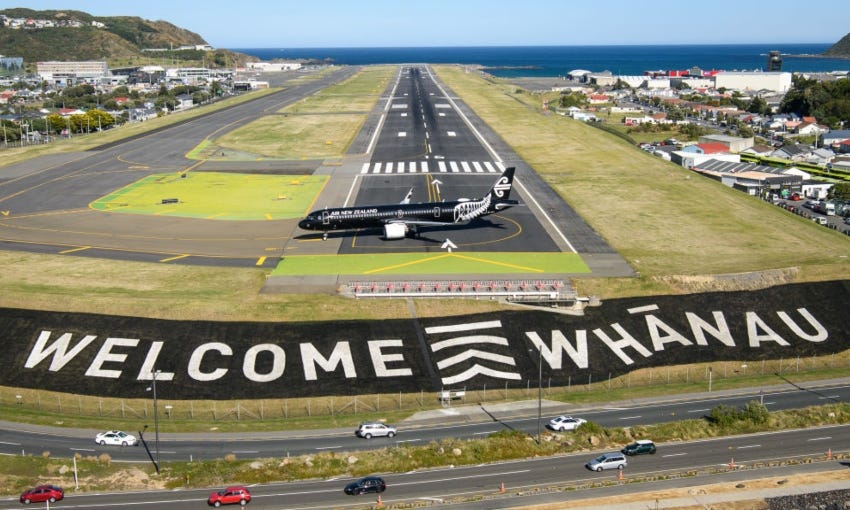What delta means for reopening plans
No return of the trans-Tasman bubble is planned soon as the government commits to a rethink of the month old strategy to reopen Fortress New Zealand
Good morning and welcome to The Bulletin for Thursday, September 9, by Justin Giovannetti. Presented in partnership with Z Energy.
In today’s edition: Truck drivers warn tests to cross Auckland’s border could cause delays, another series of cyber attacks targets New Zealand and DOC rangers say people need to be reminded to “poo in a loo” after a filthy season.
When will Wellington welcome quarantine-free flights again? (Mark Tantrum/Getty Images)
Almost a month ago the government unveiled its strategy for reopening the country’s borders. Based on advice from a group chaired by Sir David Skegg, the plan centred on marrying the elimination strategy with welcoming vaccinated travellers. There was a buzz of energy when the prime minister unveiled the “reconnecting framework” and I filed this report at the time. In brief: Starting next year countries would be ranked as low, medium or high risk. Anyone from a low risk country could travel quarantine-free. Those in the middle could undergo modified isolation, while arrivals from high risk countries would undergo a full stint in MIQ.
That plan is now at risk because of the delta variant. Covid-19 response minister Chris Hipkins told parliament on Tuesday evening that the spread of delta has led officials to start making changes to the month-old plan. “We were looking at a situation where you could stratify countries based on risk, and I think in the delta environment, we actually have to consider whether that's an appropriate thing to do,” he said.
Each person carrying the variant is now a risk, and pre-departure testing is far less useful when someone can go from infected to infectious in a day. As reported in Stuff, the original strategy had been devised at a time when delta was already known. The Skegg group has now been asked to provide the government with new advice.
What does this mean for the trans-Tasman bubble? Under the reopening plan, the prime minister had said Australian states could be ranked on their risk level and travel could eventually begin again with those that were low risk. While some states like New South Wales and Victoria are likely to remain closed for some time, owing to their high levels of delta infection, others like Tasmania have barely seen any cases this year. With the cornerstone of the reopening plan, a risk rating, now in question, I asked Hipkins yesterday what impact it’ll have on any plans to travel across the Tasman.
“It does bring a degree of realism to the timing around discussions of the trans-Tasman bubble,” he said. An announcement on the trans-Tasman bubble is due this month, but Hipkins quickly said people should not make holiday plans. “I think it would be unrealistic to expect there will be speedy decisions in the next few weeks about reopening the trans-Tasman travel bubble.”
“It’s still a while away,” he added. “Don’t hold your breath.”
In the short term, the government is still going ahead with a pilot project for business travellers. This was an area in which the government went far beyond Skegg’s recommendations and, despite the delta outbreak, Hipkins confirmed it’s sticking with the plan. It’ll be a self-quarantine pilot for a few hundred people who are fully vaccinated and going overseas on a short trip to a destination approved by the government. They’ll need the full backing of a business and a rigorous self-quarantine plan that means they’ll be completely alone for a fortnight. Based on restrictions, it seems like it’ll be limited to people who have a granny flat, a bach or those who live alone and don’t share a ventilation system with anyone else.
In the longer term, it’s unclear when mass quarantine-free travel will resume. Speaking in parliament, Hipkins said a border with nearly everyone going through MIQ won’t last beyond the “global response phase of Covid-19, which is obviously, the pandemic is still raging”. He added there will need to be alternatives, including self-isolation and a rethink of the elimination strategy itself “in a world that will increasingly become more highly vaccinated over the next year, 18 months to two years.”
I asked Hipkins if he expects MIQ to last that long. “The current model that we are working to, whilst it might still have an ongoing role, is unlikely to be the only route into the country over the medium and longer term,” he said. He declined to say whether the short term, in his mind, is the next 18 months to two years.
The Spinoff is doing our utmost to keep you updated on Covid-19 related news through this outbreak. Every dollar our members contribute directly funds our editorial team and is devoted to ensuring we do more. Click here to learn how you can support the team today.
Truck drivers are warning that Covid-19 tests for the Auckland border will cause delays. All essential workers who cross the boundary around Auckland from Friday will need to show a negative swab at least weekly. RNZ reports the ministry of health says the testing order won't be enforced for a week, but drivers are already turning up at public testing stations to get tested. There have been cases where they've been turned away because they don't have symptoms. About 4,000 truck drivers cross the city's southern border daily, along with more essential workers.
The Covid numbers: 15 new community cases were reported yesterday and 25% of the previous day’s cases were active in the community while infectious. All the cases were in Auckland. 855 cases have now been detected in the delta outbreak (one case was removed from the count because it was reclassified as border-related) and 218 people have recovered. 72,893 people were vaccinated yesterday.
Another cyber attack took down a number of New Zealand websites. Both ANZ and Kiwibank experienced issues yesterday, along with the NZ Post and MetService in the latest in a series of attacks on the country's digital infrastructure. The websites were taken offline by distributed denial of service attacks, which are designed to annoy and disable websites, not necessarily to steal information. According to BusinessDesk, the number of attacks has been mounting in recent years. The NZ Herald (paywalled) reports the surge in attacks could be related to a global awareness of level four lockdown, because people are at home and more digitally-dependent.
Why couldn't we just send the Auckland terrorist back? It's a question parliament is grappling with right now and Otago University professor Andrew Geddis has looked at it in a blog post. With the government considering a review of immigration law to allow it to deport refugees like the Auckland terrorist, Geddis writes that it really wouldn’t be so easy. Not only was he a protected person, but he faced a threat of torture in Sri Lanka. Deporting him would have broken international obligations. If that’s the case, do you detain him until the threat of torture passes?
“In other words, this form of detention could very easily morph into indeterminate imprisonment of foreign-born terror suspects under the guise of immigration law,” he writes.
A paid message from our partner Te Taura Whiri, the Māori Language Commission: Join us in celebrating te reo Māori at 12pm on Tuesday, September 14. Sign yourself and your workplace, whānau and flatmates up to our Māori Language Moment. Kia kaha te reo Māori, kia kaha Aotearoa!
The government will spend over $18.5 billion on transport over the next three years. While that might sound like a lot of money, once you factor in roads, rail, coastal shipping, cycling, public transport, road safety campaigns and soaring construction costs there will be intense competition for the cash. As Newsroom reports, some of that will be for environmentally-friendly projects as the government's big climate change plan is coming later this month.
However one of those projects is getting kicked down the road, with Auckland's light rail plans getting delayed until 2024 according to Stuff. The plan will stay a little longer in the “planning and design” phase. Despite years of work, the route and type of system hasn't been settled on yet
DOC rangers say that people have been really enjoying the great outdoors and they’ve been filthy. The complaints are significant, with people not using toilets, letting their dogs run rampant and driving in conservation areas with off-road vehicles. According to Stuff, one ranger said DOC’s campaign should be: “Poo in a loo and don't leave your rubbish.” Another added to leave your dog at home. The rangers say people feel a sense of entitlement to litter and rip through sensitive areas with four-wheel drive vehicles. With a closed border, we can’t blame this on foreign backpackers or freedom campers.
Justin Trudeau is facing an increasingly ugly campaign in Canada from anti-vaxxers. While the Liberal leader's popularity is diving in the polls, Trudeau has a faced a series of security threats on the campaign trail. Police are now investigating after a mob opposed to vaccines surrounded Trudeau’s campaign bus and began pelting him with gravel stones at an event. Police officers can be seen shielding the leader in a video from the CBC. Trudeau said the anti-vaxxers were “foaming at the mouth” to get him. Other party leaders have criticised the increasingly extreme tactics of protesters who have disrupted events, chanted “lock him up” and made threats. This is all very unusual for a Canadian campaign. The election is on September 20.
Got some feedback about The Bulletin, or anything in the news?
Get in touch with me at thebulletin@thespinoff.co.nz
Schools will look to improve ventilation in the coming days to protect students. (Tina Tiller)
Right now on The Spinoff: A group think on how to prepare your kids (outside Auckland) for a return to school today, including the thorny question of masks. Sam Brooks speaks with producers and theatre makers about what the shift to a 50 person limit under delta two means for productions. Mirjam Guesgen reports on newly funded proposals to radically change the country's pest control efforts because, well, they're barely holding their ground. Tara Ward has week one of the Celebrity Treasure Island power rankings (aka the poo cave). Finally, a new addition to The Spinoff empire, Madeleine Holden introduces IRL, a new project that looks at the real-world consequences of our online lives.
Steve Hansen thinks a new rugby format will be a hit. The World 12s concept is due to start in England next year and the former All Blacks coach has said he expects fans will love it, according to Stuff. He compared it to the fast-paced Indian Premier League. The format will start with eight teams playing 12 players, six forwards and six backs. Matches will be only 30 minutes long and the rules have been modified to make games faster. The NZ Herald (paywalled) says that the former coach's enthusiasm for the idea is born out of his frustration with a rugby code that has refused to simplify.
That's it for The Bulletin. If you want to support the work we do at The Spinoff, please check out our membership programme.







